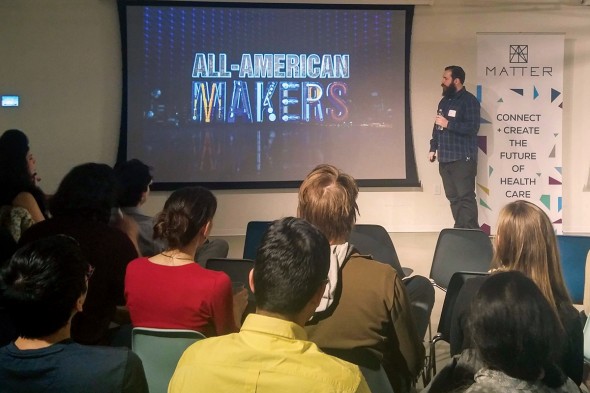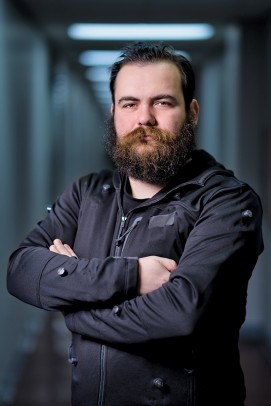Student’s SpiderSense featured on Discovery Science
A device that can help the blind see and save the lives of firefighters, police officers and soldiers. That’s how UIC doctoral student Victor Mateevitsi pitched an invention that senses for you when he appeared on the Feb. 3 episode of Discovery Channel’s “All-American Makers.”
“Because I’m a researcher, I’m used to putting my inventions and projects to the test, giving them to users and getting feedback, so even though I was nervous, I was ready and I was excited,” he said.
Mateevitsi co-invented SpiderSense for a Human Augmentics class at UIC as innovative technology meant to improve or enhance the quality of human life. Human augmentics has also been the core of his Ph.D. work. The first prototypes required several modules on the body and used echolocation or ultrasound technology to sense objects in a 360-degree range up to 60 feet away. Pressure is applied when something is close to guide users.
When Mateevitsi was invited to pitch the invention for a potential external investment on “All-American Makers,” he took SpiderSense 2.0, a portable jacket that’s an evolution of the original prototype, hoping to spark interest from Printrbot founder and owner Brook Drumm, mechanical designer and robotics expert Brian Roe and venture capitalist Marc Portney.
“It was an opportunity to see how regular people outside of the research community are going to react and how they’re going to experience it,” he said.
“All-American Makers” features four amateur inventors on each show who pitch their products for a chance to secure more financial backing. The products undergo a series of surprise tests before being tossed over to consumer focus groups that judge their abilities, potential and shortcomings. Portney then decides whether the investment is worth his while.
The episode, titled “Super Powers for Sale,” showed SpiderSense going up against advanced bike handlebars, an emergency tire inflator and a wet diaper checker.
Judges put Mateevitsi’s claims to the test.
Drumm put the jacket on and tried to navigate his way through the 36-inch-wide path while blindfolded. He was guided by the jacket’s 12 sensors —including two on the shoulders, upper back, chest, lower back, abdomen and wrists — that tingle when the modules sense that something is nearby. Drumm was able to sense where others were around him in the first test but became a bit disoriented in the second test because he was “completely overwhelmed,” Mateevitsi said. Drumm knocked over some obstacles, but he was still able to get through the entire maze.
Suggestions for improvement from the testing phase included inverting the sensors so users could feel openings or clear paths instead of objects, and adding an option to change the sensitivity of the sensors. Mateevitsi plans to test and include those suggestions in future prototypes.
The focus group included a firefighter and a blind man — both praised the invention’s benefits.
Appealing to the invention’s target market “was the grand slam,” Mateevitsi said.
Although Portney decided not to invest, Mateevitsi received a score of seven out of 10 for his SpiderSense jacket, the second-highest score on the show.
He hopes to commercialize SpiderSense in the near future.
“Superpowers for Sale” is available online but restricted to those who subscribe to the Discovery Science channel.
Categories


